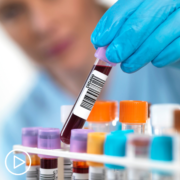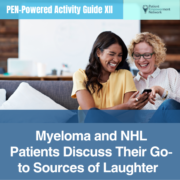Metastatic Breast Cancer: Debunking Common Misconceptions
Metastatic Breast Cancer: Debunking Common Misconceptions from Patient Empowerment Network on Vimeo.
Dr. Julie Gralow debunks common misconceptions about metastatic breast cancer, including the metastatic diagnosis itself and why genetic tests are important.
Dr. Julie Gralow is the Jill Bennett Endowed Professor of Breast Medical Oncology at the University of Washington, Fred Hutchinson Cancer Research Center, and the Seattle Cancer Care Alliance. More about this expert here.
See More From INSIST! Metastatic Breast Cancer
Related Resources:
Transcript:
Katherine:
All right. Dr. Gralow, when you meet with patients, what are some of the more common misconceptions that you hear related to diagnosis?
Dr. Gralow:
Well, I think people do confuse – especially at an early diagnosis – that the metastases, the travel to the local lymph nodes, is not the same as a metastatic breast cancer, so we spend some time talking about how it’s still curable and not considered a distant metastasis if the lymph nodes are in the armpit or up above the collarbone, and so, that’s something that we spend some time talking about.
This whole term of “metastatic recurrence” – unfortunately, when you start looking online and get your information from Dr. Google, you read right away that it’s no longer curable, and in 2020, yes, that’s true. That’s probably the most specific statement that we can make. We are not going with curative intent, which means we treat for a defined amount of time, and then all the disease goes away, and we stop treatment, and then you go on with your life, and it never comes back. That would be cure.
But, I think it’s really important to point out that much of metastatic breast cancer can be highly treatable, and what we hope to do – and certainly, at least a subset of metastatic breast cancer – we want to convert it more to what we would call a chronic disease, and so, think of it more like hypertension, high blood pressure, or diabetes. These are diseases that we generally don’t cure with treatment, but that we can control with drug therapy, which sometimes has to be adjusted, and if we don’t control it, we can get some bad complications.
So, that’s not all metastatic breast cancer, unfortunately – we can’t convert all of it to something where we can use a therapy for a long time that keeps it in check and where you have a pretty good quality of life – but we’re hoping that more and more, we’re getting targeted therapies and more specific treatments to patients so that we can convert more patients to a more chronic kind of situation.













